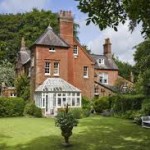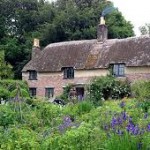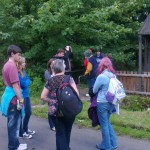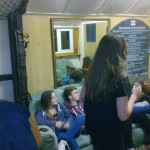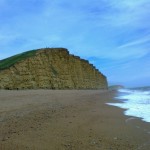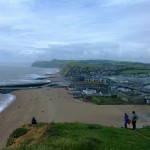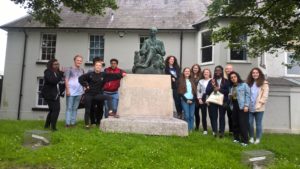 Hardy 2016: A thoroughly good time was had by all on this, the 10th anniversary of the legendary Thomas Hardy Field Trip. It was a poignant occasion too as it was JMR’s farewell tour. It may be the last trip too, but never say never…
Hardy 2016: A thoroughly good time was had by all on this, the 10th anniversary of the legendary Thomas Hardy Field Trip. It was a poignant occasion too as it was JMR’s farewell tour. It may be the last trip too, but never say never…
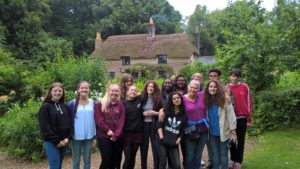 “I look and see it there, shrinking, shrinking
“I look and see it there, shrinking, shrinking
I look back at it amid the rain
For the very last time; for my sand is sinking,
And I shall traverse old love’s domain
Never Again.”
(At Castle Boterel)
The English Department has organised an annual visit to Dorset since 2006. The theme is the landscape and writing of Thomas Hardy, with a particular focus on his poetry and the tragic novel Tess of the D’Urbervilles.
This is a review of the first trip in 2006:
“There are some heights in Wessex, shaped as if by a kindly hand
For thinking, dreaming, dying on, and at crises when I stand…
I seem where I was before my birth, and after death may be.”
From ‘Wessex Heights’ by Thomas Hardy
Starting out from the school car park under a fine July sky, a shabby mob of English Literature students and teachers commenced an expedition to follow in the footsteps of one of Thomas Hardy’s most famous (and at the time of its publication, most scandalous) characters, Tess of the D’Urbervilles. With Mr Hand as our chauffer and Mr Lovelock as navigator, we were in for a bumpy ride. Of course, this was after room had been made for Miss Healy’s ample luggage in the rear of the tiny minibus.
Our first stop on our voyage to merry Dorset was Golden Hill in Shaftsbury. As many of us recognised, the hill was the very self same that was used in the Hovis adverts of old, which was one of Hardy’s favourite loaves, why would they show us if it wasn’t? However, Shaftsbury is near Shaston where Tess was born
Once we were on the road again we passed a very historic landmark, Stonehenge, and it was here that Tess was arrested for the murder of her ravisher. All these splendid sites were accompanied by eloquent readings from Hardy’s novel, much to the delight of pupil and teacher alike, by Mr Hand.
We arrived at Litton Cheney and the hostel, our home for the weekend, sometime in the afternoon. After everyone paired off into cosy rooms and fought over bunks to sleep on, the whole group took it upon themselves to investigate the local sites. The rolling hills and dales, the bright blue skies, large green fields and the local pub which was a few stumbling steps away from the hostel. As one might expect, the rest of the night was spent celebrating our arrival in, as Mr Hand insisted on calling it, “Hardy Country”.
Up at seven, or thereabouts, to ready our own breakfasts and pre-packed lunches before we travelled to the Dorchester Museum. Amongst the exhibitions of local folklore and history was a wonderful display on Hardy. The room where he penned many of his poems and novels had been restored inside the museum and presented the whole group with a deeper insight into what it was like to be Thomas Hardy.
After a short walk around town in Dorchester, we set off for the Parish of Stinsford. It was here, in St. Michael’s Church, the Hardy family were laid to rest, all except for the body of Thomas Hardy himself. His heart was buried alongside his first wife Emma, but his body was buried in ‘Poet’s Corner’ in Westminster Abby. Taking a look around the small church, we were privileged yet again to another of Mr Hand’s readings. We ate our lunches amid the gravestones under a wonderfully blue sky, and then set off for the seaside.
Our visit to Weymouth had very little to do with Hardy, apart from a pedalo that shared the poet-novelists name. Dinner was a nice fish and chip meal kindly suggested by Mrs Smart and the other teachers. Back to Litton Cheney and to everybody’s delight, a live band was playing down at the White Horse. The now famous Vinyl Monkeys were playing for a guy’s 21st birthday, and we couldn’t help but join in the celebration.
After another late night it was our final day in ‘Hardy Country’, so where better to start the end of the journey than the birthplace of Thomas Hardy in Upper Bockhampton. He lived in, what is now, a beautiful little cottage surrounded by a vivid garden in a secluded wood. It was in that environment he was struck with inspiration for many of his poems and novels. After a short tour, the whole rabble had a group photograph with this idyllic setting behind us. Homeward bound, with Mr Hand driving as expertly as he had been all weekend, I had to put up with his and Mr Lovelock’s ‘witty’ banter.
Then, to end our trip, we stopped off in Winchester. One last reading from Mr Hand told us that this was were Tess had been hanged for her crime. A quick look around the town and a bite to eat concluded our enactment of the movements of Tess of the D’Urbervilles and an appreciation of one of England’s most interesting poets, Thomas Hardy.
Of course, each Literature student would like to thank Mr Hand, Mr Lovelock, Mrs Smart and Miss Healy for a wonderful trip and keeping us all in check.

